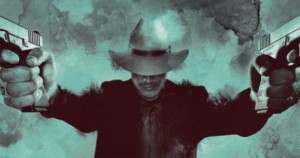It’s been crazy since the holidays between my writing deadlines, promotion for my latest release Indigo Awakening, and all the relatives coming in and out of town. But this week I’ve been saved. Elmore Leonard’s Justified is back for Season 4 and the first episode – Hole in the Wall – did not disappoint. It was “happy dance” fun.
Yes, Raylan and his bad ass Hat-itude inspires me to dig deep for insanely evocative dialogue and characters that make me cringe and laugh at the same time. I see this series as pure writer inspiration. (I love Elmore Leonard.) There were shockers in this first show. Don’t worry. No spoilers, but for anyone who saw it, I’m already filling my Constable Bob “Go To” bag with all the necessaries to kick some fictional butt in 2013.
What would you put in YOUR “go to” writer’s bag this year? Any resolutions? Here are FIVE writer things I learned from being JUSTIFIED.
1.) Never discount the importance of a good secondary character. Constable Bob is a prime example of how a well-written secondary character can steal your scenes and maybe become a spin-off.
2.) Writing one book can lead to another if you plant the seeds. Add a super hot bail bonds woman, a hotel mini-bar, and a marshal with pliable ethics and you can have a future book plot. Leave threads or seeds to another plot in your current work-in-progress. It never hurts to have ideas and it may leave readers wanting more.
3.) Dark humor is gold. When a loaded hooker comes face to face with something “grizzly” in her place of “business” or a simple phrase like “take care of him” can be construed in more than one way, a well-placed bullet can be JUSTIFIED funny.
4.) Give your anti-heroes loads of baggage and a cast of characters around them that will push their ethics to their darkest depths. Test them. Right from the start, Raylan is tempted into “helping” bring a fugitive to justice, especially if he can benefit from a little bounty money on the side and sees no harm in taking a modest gratuity. What comes next escalates his woes into pure Raylan MO when he has to cover his butt from getting caught. (Hint: If you talk too much, you get a special seat in his car.)
5.) To get a great pace going, jump into the plot without too much back story. The sheer mystery will draw readers in until your reveal. Have patience and don’t “telegraph” where you’re headed. Readers love a twist they never saw coming.
For the premiere, I followed twitter hashtag #JUSTIFIED while I watched the show to see what followers found interesting or memorable. Die hard fans are hilarious and they often quote whole lines to let everyone know what got to them. Twitterville heated up with Justified fans and I had even more fun. Many writers joined in the fun.
So tell me what you’d put in your writer’s TO GO bag for 2013—to be ready for anything like Constable Bob. Or please share what JUSTIFIED has taught you, whether you’re a reader or writer. (I’m pretty sure I’ll never ask Raylan’s daddy Arlo about what he likes to read. Just sayin’.)
Here’s a sneak preview of next week’s episode. If you have trouble viewing it, here is the Youtube link: http://youtu.be/mtMFLlk5lKk


